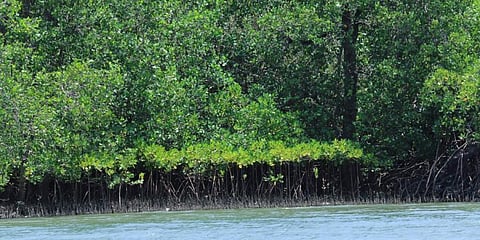Uttarakhand first state in country to measure Gross Environment Product
DEHRADUN: Uttarakhand state is going to become the first state of the country to measure Gross Environment Product (GEP) for quantifying ecological growth measurement.
A five-member committee in this regard has already been formed which is headed by the principal secretary of forests, Uttarakhand.
Anand Bardhan, principal secretary, forest department, Uttarakhand said, "The committee with illustrious experts and scientists will be looking into how to devise a method so that we can measure the GEP in the same way like GDP. In this way, we will be able to calculate material value of wealth from our forests. This will further enable us framing policies keeping pointed at wildlife and environment.'
The decision came last week during a meeting held at Wildlife Institute of India (WII).
The participants in the meeting included the names of luminaries like professor K Vijay Raghavan, principal scientific advisor (PSA) to the government of India, chief secretary of Uttarakhand, principal secretary for forests of Uttarakhand, Anil Prakash Joshi, founder of Himalayan Environmental Studies and Conservation Organisation (HESCO) along with scientists from Wadia Institute of Himalayan Geology, Department of Water Resource Development and Management from Indian Institute of Technology, Roorkee.
Anil Prakash Joshi, a Padma awardee environmentalist, the man behind the concept has been advocating the implementation of the idea across the country especially in the Himalayas for years.
The demand caught pace after the 2013 tragedy of Uttarakhand which claimed thousands of lives.
"The implementation of the concept and calculation of the GEP will let us understand the impact of anthropological pressure on our ecosystem and natural resources- air, water, soil, forests. This will enable us to make policies which will allow sustainable development," said Joshi who has been advocating this since year 2010.
From time to time, various reports indicate bad state of affairs in the hill state.
According to a Greenpeace report released in January this year, Dehradun is almost 11 times more polluted than prescribed standards of World Health Organization standards and worse than Kanpur.
Dehradun city stood at 15th spot among 287 cities across India in terms of air pollution with PM10 levels at 217 micrograms per cubic meter while Kanpur city stood at 17th position with PM10 levels of 210 micrograms per cubic meter for the year 2018.
The report, titled 'Airpocalypse IV' is prepared on the basis of PM10 levels in the air.
Recorded PM10 levels of Dehradun for year 2018 is 3.6 times more polluted than National Ambient Air Quality Standards (NAAQS) limits and almost 11 times the World Health Organization prescribed limits for PM10.
Earlier, in 2018, a report released by Uttarakhand Environment Protection & Pollution Control Board (UEPPCB) stated that in the year 2016-17, 272.22 tonnes per day plastic is generated out off total waste generated which will reach up to 457.63 tonnes till the year 2041.

